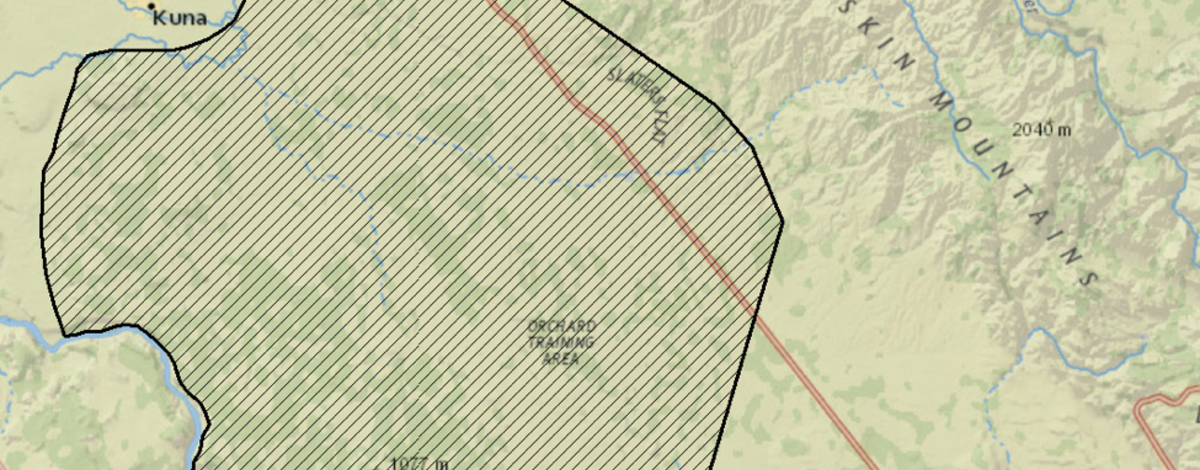Idaho Department of Fish and Game
Central District Health Department
Preliminary tests of ground squirrels (whistle pigs) found dead in desert areas of Ada and Elmore counties have come back positive for plague. Idaho public health and Idaho Fish and Game officials are asking people to take precautions as outdoor summer activities shift into high gear over the long Memorial Day weekend.
Last year, plague was confirmed in ground squirrels in the same general areas of southern Idaho (see map below). Plague can circulate in wild animal populations every year. Confirmatory laboratory tests are being conducted, with results expected next week.
Plague is a bacterial disease of rodents that is transmitted through the bites of infected fleas and can cause serious illness to people and pets if not treated quickly. It also can be transmitted to people by direct contact with infected animals, including rodents, rabbits and pets. Common rodents that can become infected include ground squirrels, rats, voles and mice. Tree squirrels in Idaho are not known to carry plague.
“Just like last year, our investigation began in May after hearing reports from people finding dead ground squirrels in the desert southeast of Boise,” State Wildlife Veterinarian Dr. Mark Drew said. “We hope to have confirmation of these results soon and will keep the public up to date as we learn more.”
People can greatly reduce their risk of becoming infected with plague by taking simple precautions, including avoiding contact with wild rodents, their fleas and rodent carcasses. Health officials recommend:
- Do not feed rodents in picnic or campground areas and never handle sick or dead rodents.
- Keep your pets from roaming and hunting ground squirrels or other rodents in affected desert areas.
- Talk to your veterinarian about using an appropriate flea control product on pets as not all products are safe for cats, dogs or children.
- Clean up areas near your home where rodents can live, such as woodpiles.
- Sick pets should be examined promptly by a veterinarian, especially if they may have had contact with sick or dead rodents in the desert areas south and east of Boise.
- See your doctor if you have any unexplained illness involving a sudden and severe fever after being in a plague-impacted area.
- Put hay, wood, and compost piles as far as possible from your home.
- Don’t leave pet food and water where rodents or other wild animals can access them.
Symptoms of plague in humans include sudden onset of fever, chills, headache, and weakness. In most cases there is a painful swelling of the lymph node in the groin, armpit or neck areas. Plague symptoms in cats and dogs are fever, lethargy and loss of appetite, with possible swelling in the lymph node under the jaw. With prompt diagnosis and appropriate antibiotic treatment, the fatality rate in people and pets can be greatly reduced. Physicians who suspect plague should promptly report it to their local public health district.
Idaho Fish and Game is interested in reports of multiple (greater than five) dead ground squirrels, yellow-bellied marmots (aka “rock-chucks”), voles, cottontail rabbits or jackrabbits. Please do not report single mortalities; observations of multiple mortalities are a greater indicator of possible plague activity. If people find groups of five or more dead animals listed above, they should not touch them, but should report the location to the Idaho Department of Fish and Game at https://idfg.idaho.gov/plague. All reports are reviewed and appropriately handled, however, not all people submitting reports will be contacted for follow-up.
Since 1940, only five human cases of plague have been reported in Idaho. The last two cases reported in Idaho occurred in 1991 and 1992, with both patients fully recovering. In 2015, a dog tested positive for plague after ground squirrel exposure. The dog recovered after medical treatment.
For more information:
- General overview: www.cdc.gov/plague/
- FAQs: www.cdc.gov/plague/faq/index.html
- Protect Yourself From Plague fact sheet http://www.cdc.gov/plague/resources/235098_Plaguefactsheet_508.pdf
- Idaho Department of Fish and Game: fishandgame.idaho.gov
Map of suspected area where plague is expected to be present in wildlife. Please take precautions when visiting this area and adjacent areas where ground squirrels live. The attached flyer will be posted at the main access points of the affected area.
Editors: For public health questions, please contact Christine Myron or Tom Shanahan. For questions about the affected area or animal infections, please contact Mike Keckler. State and district health offices are open 8 a.m. to 5 p.m. Monday – Friday, and will be closed for Memorial Day weekend.
Central District Health Department Christine Myron Public Information Officer (208) 327-8639
Department of Health and Welfare Tom Shanahan Public Information Officer (208) 334-0668 healthandwelfare.idaho.gov
Idaho Fish and Game Mike Keckler Bureau Chief for Communications (208) 287-2870

